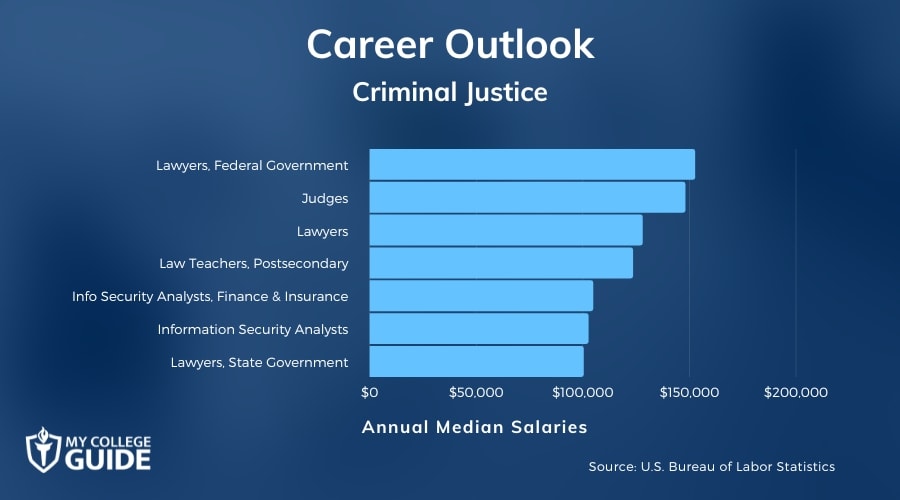Are you passionate about justice and have a knack for leadership? Then you may want to consider the many criminal justice careers available.

The first step toward this career path is to obtain your criminal justice degree. A criminal justice degree opens the door to many opportunities from security guards and police officers to judges and lawyers.
Editorial Listing ShortCode:
A career in criminal justice sets you up for a lifetime of helping others and supporting your community in a variety of ways.
What Can You Do With a Criminal Justice Degree?

A criminal justice degree opens up many opportunities within the criminal and law fields. If you want to help better your community, you may want to be on the streets fighting crime as a police officer.
According to the U.S. Bureau of Labor Statistics, police officers earn an annual median salary of $64,610. Similarly, probation officers also work to keep the streets free of crime and ensure criminals are adhering to their probation requirements. Probation officers have an annual median salary of $60,250.
Editorial Listing ShortCode:
If you prefer to be behind the scenes working as a detective, you can expect to earn an annual median salary of $83,640. If you like the scientific approach to criminal justice, becoming a forensic science technician may be of interest to you.
There are many other career paths available to those with a criminal justice degree including criminal justice teachers, investigators, security guards, and more.
10 Things You Can Do with a Degree in Criminal Justice
A degree in criminal justice can prepare individuals for a variety of careers in public and private sectors, such as police, probation, public safety, or security officers and career teachers.
Other careers in the criminal justice system can include positions in the court system, forensics, or private practices as an investigator, detective, or counselor. Criminal justice degrees are designed to prepare students for various roles found in several industries.
1. Police and Detectives

Education Requirement: High school diploma
Projected Job Growth: 3% increase
Police officers are responsible for enforcing the law and responding to emergency and non-emergency calls. They have the authority to obtain warrants to conduct searches and make arrests for those who violate the law.
Detectives gather information and evidence for criminal cases by conducting interviews and investigating crimes and suspects. Police officers and detectives are often tasked with writing reports on their cases and maintaining them in organized files.
2. Forensic Science Technician

Education Requirement: Bachelor’s degree
Projected Job Growth: 11% increase
Forensic science technicians collect evidence from crime scenes and analyze evidence in laboratories for criminal investigations. Some may only work on crime scenes or strictly in a lab.
Some of the daily responsibilities of this position may include taking photographs of crime scenes, creating sketches, recording observations, and collecting items on a crime scene to be analyzed and tested as evidence.
3. Private Detective and Investigator

Education Requirement: High school diploma
Projected Job Growth: 6% increase
Private detectives and investigators conduct research on cases by gathering information from interviews, surveillance, and checking public and court records. They can be hired by individuals, businesses, or public organizations.
According to the U.S. Bureau of Labor Statistics, the majority of private detectives and investigators are self-employed. They can also work for investigation and guard services, finance and insurance organizations, or the government.
4. Security Guard

Education Requirement: High school diploma
Projected Job Growth: 3% increase
Security guards are responsible for protecting individuals or property from various illegal activities. They can work in many different environments, such as stores, private businesses, and public buildings.
Editorial Listing ShortCode:
Security guards are usually tasked with patrolling assigned areas, ensuring that individuals are following rules and regulations, and responding to emergencies that may arise. They’re typically responsible for contacting law enforcement when necessary.
5. Paralegal and Legal Assistant

Education Requirement: Associate’s degree
Projected Job Growth: 14% increase
Paralegals and legal assistants work in the field of law. Most are employed by legal services, but they can also work in local, state, and federal government and finance and insurance.
The work environment for this career is typically team-oriented and they often coordinate with attorneys and fellow legal assistants. Common daily tasks may include studying cases to gather facts and maintaining important legal documents properly.
6. Public Safety Telecommunicator

Education Requirement: High school diploma
Projected Job Growth: 4% increase
Public safety telecommunicators are responsible for answering emergency and non-emergency calls. Some titles for this position are known as 911 operators or fire dispatchers. They assist callers with issues by collecting information, providing resources, and sending help when needed.
911 operators and fire dispatchers regularly communicate with first responders and law enforcement. They relay information to the proper agencies and maintain call records.
7. Information Security Analyst

Education Requirement: Bachelor’s degree
Projected Job Growth: 35% increase
An information security analyst works to develop and improve security measures for computer systems. They work in cybersecurity to prevent security breaches and come up with solutions if a breach occurs.
Top employers of information security analysts include computer systems design services and finance and insurance. Some daily tasks they perform include analyzing computer networks and systems to check for security issues and staying aware of the latest security trends.
8. Lawyer

Education Requirement: Doctoral or professional degree
Projected Job Growth: 10% increase
Lawyers are legal advisers that work in the court system of criminal justice. Many lawyers are employed by legal services or self-employed. They represent clients, including individuals, businesses, and government agencies.
Some examples of a lawyer’s daily responsibilities include communicating with clients and representing them in court, researching laws, and reviewing legal documents. Individuals may study criminal justice before attending law school to become licensed to practice law.
9. Forensic Psychologist

Education Requirement: Doctoral degree
Projected Job Growth: 6% increase
Forensic psychologists use the study of human behavior and apply it to the field of criminal justice. They coordinate with legal professionals in the court system and advise them on psychological matters pertaining to cases.
Editorial Listing ShortCode:
Individuals may obtain a bachelor’s in criminal justice and pursue a specialized graduate degree in forensic psychology to become licensed. Common responsibilities include conducting research on criminal behaviors, developing criminal profiles, and conducting psychological assessments.
10. Career Teacher

Education Requirement: Bachelor’s degree
Projected Job Growth: 2% increase
A career teacher provides instruction and training to individuals. Career teachers in criminal justice may work in training institutions or career schools.
Career teacher responsibilities may include creating lesson plans and assignments, tracking student progress, and helping students apply knowledge and skills to real-world problems. Most career teachers work in postsecondary institutions, according to the BLS.
Criminal Justice Careers & Salaries

Once you have earned a criminal justice degree, you can pursue various career ideas in either law enforcement or the legal field.
For a comprehensive look, we’ve put together a list of the top 40 criminal justice careers & salaries within the expansive field of criminal justice according to data from the U.S. Bureau of Labor Statistics:
| Careers | Annual Median Salaries |
| Lawyers, Federal Government | $152,590 |
| Judges | $148,030 |
| Lawyers | $127,990 |
| Law Teachers, Postsecondary | $123,470 |
| Information Security Analysts, Finance and Insurance | $104,790 |
| Information Security Analysts | $102,600 |
| Lawyers, State Government | $100,330 |
| Detective Lieutenants | $99,330 |
| Judges, Local Government | $98,060 |
| Federal Government Detectives | $93,970 |
| Criminologists | $92,910 |
| Detectives | $83,640 |
| State Detectives | $72,280 |
| Fraud Investigators, Insurance | $65,080 |
| Transit and Railroad Police | $64,930 |
| Police and Sheriff’s Patrol Officers | $64,610 |
| Criminal Justice Teachers, Postsecondary | $64,600 |
| Forensic Science Technicians, State Government | $64,250 |
| Private Detectives, Insurance | $64,010 |
| Private Detectives, Local Government | $62,090 |
| Forensic Science Technicians, Local Government | $61,930 |
| Social Workers | $61,190 |
| Fish and Game Wardens | $60,730 |
| Substance Abuse Counselors, Government | $60,450 |
| Probation Officers | $60,250 |
| Correctional Officers, Federal | $59,920 |
| Private Investigators | $59,380 |
| Paralegals | $56,230 |
| Legal Support Workers | $54,860 |
| Substance Abuse Counselors | $48,520 |
| Bailiffs | $48,320 |
| Social Workers, State Government | $48,090 |
| Correctional Officers | $47,920 |
| Court Clerks | $44,610 |
| Jailers, Local Government | $42,120 |
| Gambling Surveillance Officers | $35,450 |
| Security Guards, Sports | $33,080 |
| Court Messengers | $33,050 |
| Protective Service Workers | $31,550 |
| Security Guards | $31,470 |
When considering a degree in criminal justice, it is smart to use reputable sources such as the BLS to look at the criminal justice career outlook.
For example, the BLS projects that private detectives and investigators will see a 6% growth rate over the next decade, faster than the average for all occupations. In the new and rapidly expanding field of forensics, there is expected to be an 11% increase over the next 10 years.
Editorial Listing ShortCode:
For those who want to make a difference in their communities, criminal justice can be an extremely rewarding field. Whether you are interested in supporting laws behind the scenes or want to be up close to the action, the opportunities are endless for careers in which you can use your degree in criminal justice.
How to Know if a Degree in Criminal Justice is Right for Me

Criminal justice is an ideal degree program for individuals who are interested in the criminal justice system and want to help others and their community.
If you want a career that may involve being active and working in a team environment, a criminal justice degree might be a good path for you. Individuals who aspire to work in law enforcement, the court system, forensics, or correctional facilities may begin their educational journey with a degree in criminal justice.
Some of the main topics explored in a criminal justice degree can include:
- Criminal procedures and processes
- Psychology of abnormal and criminal behavior
- Methods of criminal investigation
- Ethical issues and legal processes in the criminal justice system
Many criminal justice degrees offer specializations, which can allow you to explore your specific interests further. Individuals who wish to gain a higher position may start out with a bachelor’s in criminal justice and pursue a master’s in a more concentrated field of study.
Criminal justice career paths can be very versatile. You can gain a variety of skills, which can be applied to multiple careers within the criminal justice field. This can be useful if you wish to move up in rank within law enforcement or explore other career options later on.
Is Financial Aid Available?

Financial aid eligibility is dependent upon several factors. Students may receive federal student financial aid if they demonstrate financial need and are enrolled in an eligible educational program. A few factors that can affect financial aid eligibility include your enrollment status, cost of attendance, and Expected Family Contribution.
To see if you’re eligible for federal financial assistance, you can fill out a Free Application for Federal Student Aid (FAFSA) through the U.S. Department of Education. The application allows prospective schools to determine how much financial aid you may receive if you’re eligible.
What Is a Criminal Justice Degree?

A criminal justice degree is a field of study that prepares you for a career within the public service and law enforcement fields. It focuses on teaching you the skills needed to enforce and uphold laws and regulations at a local, state, or federal level.
There are online criminal justice degrees available at the associate’s degree level up through doctoral degrees. In addition to educational requirements, much like with careers in counseling and careers in culinary arts, most criminal justice careers emphasize real-life experience.
There are many ways to customize your criminal justice degree program so it matches up with your long-term goals. Some of the common concentrations that you can choose from include:
- Crime Scene Investigation
- Homeland Security
- Corrections
- Juvenile Justice
- Law Enforcement
Keep in mind, if you are already in the workforce or juggling family commitments, there are many colleges that offer reputable online degree programs.
What is a Criminal Justice Major Good for?

A criminal justice major is a multidisciplinary degree that helps individuals gain skills and knowledge that can be applied to real-world issues. It gives students the opportunity to get a deeper understanding of law enforcement operations and the justice system.
Editorial Listing ShortCode:
Some of the best jobs for law enforcement may be pursued by individuals who hold a degree in criminal justice. A bachelor’s in criminal justice can be a good foundation for individuals interested in graduate-level degrees in a related field.
What Do You Learn in Criminal Justice?
The main themes in criminal justice curricula include the study of law enforcement, corrections, and the criminal justice system as a whole.
Students can adopt skills in legal knowledge, forensics, communication, critical thinking, and leadership. Various processes, procedures, and methods involved in criminal justice work are examined. Specializations may be available for some degree programs, which concentrate on specific areas in the field.
Some core courses in criminal justice programs may include the theory and practice of criminal law, criminology, and criminal investigation methods. These courses are designed to equip students with essential skills used in criminal justice degree jobs.
How Much Can You Make with a Criminal Justice Degree?

Annual salaries for professionals with a criminal justice degree can vary depending on their level of education, amount of experience, and where they live. According to the Bureau of Labor Statistics, the median salary of police officers and detectives is $66,020.
The median salary for forensic psychologists is $81,040 per year. Public safety telecommunicators earn a median salary of $46,630 annually, according to the Bureau of Labor Statistics. Salaries can also depend upon the type of industry you work in. Many positions may be available in the public and private sector.
What Are Some Entry-level Criminal Justice Jobs?
The criminal justice field has several entry-level positions that may be pursued with a high school diploma and training or an undergraduate degree.
Police officer and detective positions may be available to individuals who have a high school diploma and complete any training that may be required for the position. Other entry-level jobs in the field include security guards, public safety telecommunicators, and legal assistants.
Editorial Listing ShortCode:
Some employers may only consider candidates who have a certain amount of work or education experience. Job availability can also differ depending on where you’re located.
What Are the Highest Paying Criminal Justice Jobs?

Salaries can widely vary in the criminal justice field. Some of the highest paying criminal justice jobs include lawyers, information security analysts, criminologists, forensic psychologists, and forensic accountants.
The amount of work experience you have in the field can affect your salary. Individuals who are new to the field may be offered a lower salary than professionals who have more field experience. Salaries can also be dependent upon where you’re located and your level of education. Individuals who obtain a graduate-level degree may receive a higher salary, depending on the type of job.
What’s the Difference Between Criminology vs. Criminal Justice?
Criminology and criminal justice degree program curriculum may have overlapping foundational coursework, but here are some differences between the two:
| Criminology | Criminal Justice |
|
|
Individuals who study criminology may be interested in careers as an investigator, analysts, or forensic psychologists. Criminal justice programs have a more broad focus on the justice system. Individuals in the criminology and criminal justice field often work together to accomplish objectives.
Is a Criminal Justice Degree Worth It?

Yes, a criminal justice degree is worth it for many professionals. It’s a versatile degree program that can equip students with skills that can be applied to several industries. Numerous criminal justice jobs offer opportunities for career advancement with additional experience or training.
Editorial Listing ShortCode:
A criminal justice degree may give you several career path options. It can also prepare individuals for graduate-level degree programs. A number of criminal justice careers, such as private detectives and investigators, are expected to experience as fast as average job growth within the next decade, according to the Bureau of Labor Statistics.
Getting Your Criminal Justice Degree Online

If you’re interested in helping others and want to work in a team-oriented environment, you might consider a criminal justice degree. It can be a beneficial program for individuals who want to work in law enforcement, the court system, or for a private organization.
Criminal justice degree programs are designed to prepare individuals to take on various roles within the field, including investigative careers, counseling, security, or law. Some programs may allow you to personalize your coursework to acquire skills specific to your desired career.
You can begin your path toward a criminal justice degree by exploring accredited institutions and programs that best support your interests and goals.
